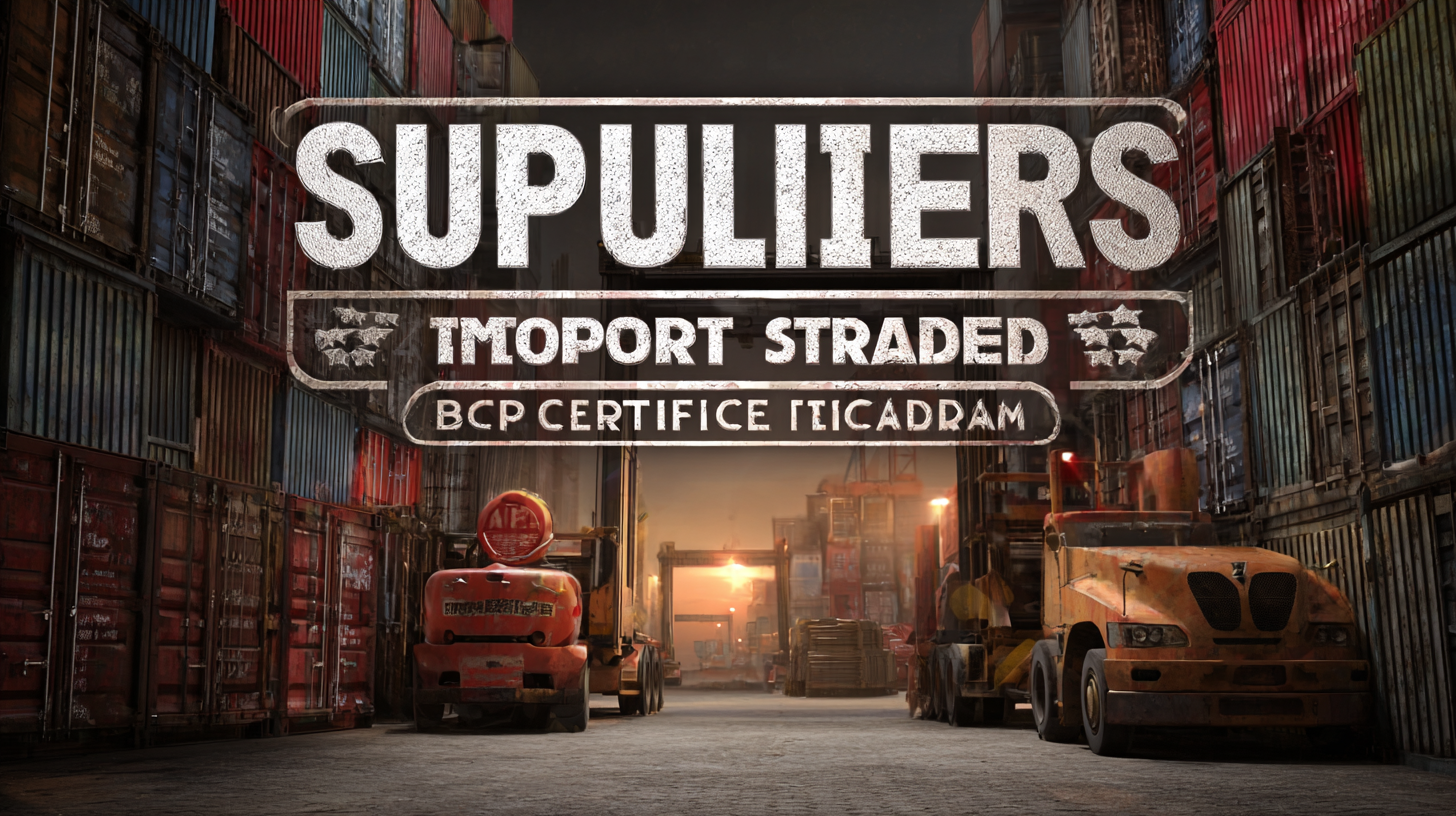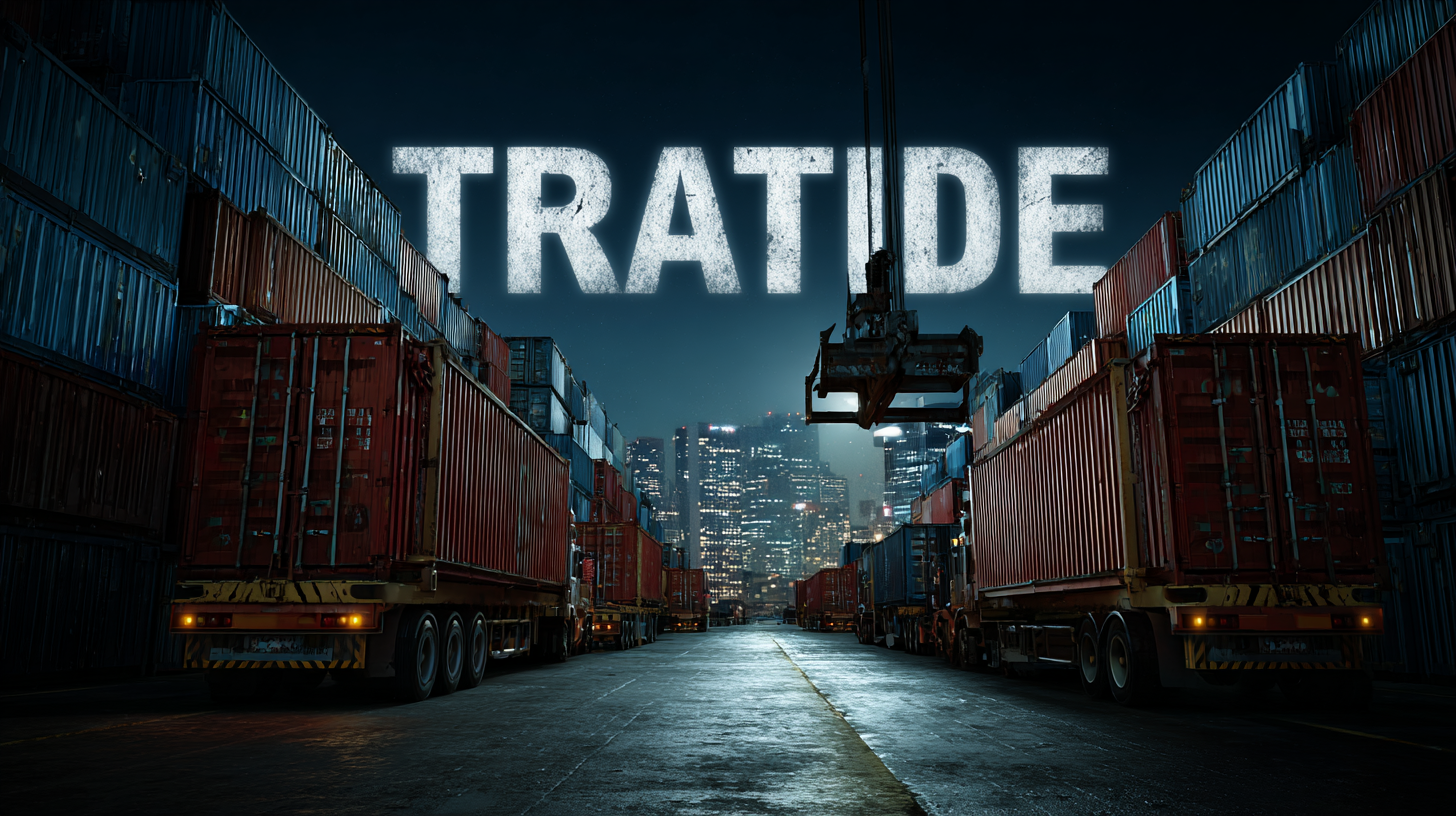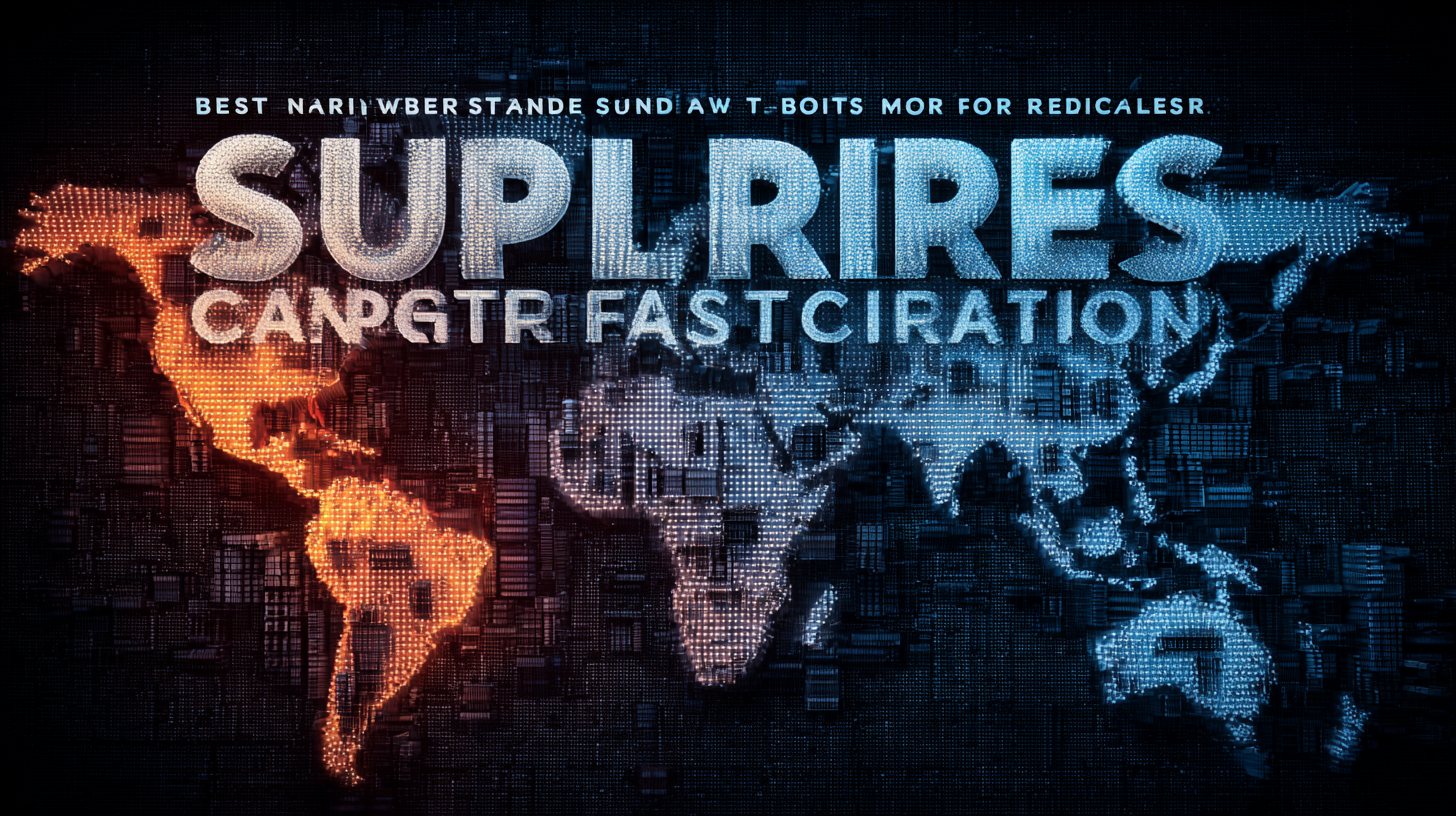Navigating Global Trade Standards How Best Suppliers Meet Import Export Certification Requirements
In the intricate world of global trade, navigating the myriad certification requirements for import and export can pose significant challenges for businesses. Suppliers, being the pivotal link in the supply chain, must adeptly manage these standards to ensure compliance and maintain competitiveness in the international market. Understanding the various certifications, from safety and quality assurance to environmental regulations, is crucial for suppliers looking to expand their reach.
This blog will explore how the best suppliers not only meet but exceed the necessary certification requirements, showcasing industry best practices that facilitate smoother transactions across borders. By delving into these standards, suppliers can effectively bolster their credibility, enhance their product offerings, and cultivate long-lasting relationships with their international partners.
The Importance of Understanding Global Trade Standards
Understanding global trade standards is essential for suppliers aiming to thrive in the competitive international market. As per the World Trade Organization, trade represented over 20% of global GDP in 2022. Compliance with these standards not only ensures legal adherence but also fosters trust and credibility with partners and consumers worldwide. Suppliers who grasp these standards can minimize delays in customs, avoid penalties, and enhance their ability to compete effectively on a global scale.
Tips for Suppliers: Regularly review your compliance status with international regulations such as the ISO (International Organization for Standardization) certifications relevant to your industry. Leverage online resources and professional networks to stay updated on changes in trade laws and standards.
To excel, suppliers must also adopt a proactive approach to documentation and certifications required for imports and exports. According to a report by Deloitte, companies that prioritize understanding global standards are 25% more likely to experience growth in international markets. Establishing a thorough knowledge base about labeling requirements, product safety standards, and quality assurances can significantly streamline the import-export process and open new avenues for business expansion.
Tips for Suppliers: Engage with trade compliance experts to conduct regular audits of your processes and ensure continual alignment with evolving global standards. Additionally, consider attending international trade fairs to gain insights into the best practices adopted by industry leaders.
Key Certifications That Impact Import and Export Activities
In the realm of international trade, navigating the certification requirements is crucial for suppliers aiming to meet import and export standards. Recent updates highlight the need for stringent compliance, especially with the European Union's 14th sanctions package impacting trade dynamics. The compliance obligations are expanding, compelling suppliers to stay abreast of evolving regulations that may affect their operations. Understanding key certifications, such as the proof of origin, is vital for facilitating smoother trade processes and ensuring lawful transactions.

Moreover, nations like Vietnam are tightening their control over trade documentation, with significant changes such as revoking the VCCI's role in issuing certificates of origin. These shifts underscore the importance of being informed about which certifications carry weight in specific regions. As businesses increasingly rely on clear and accurate documentation, comprehending the implications of new regulations can help suppliers mitigate risks and advance their global trade initiatives.
Adopting best practices in certification compliance not only enhances operational efficiency but also plays a fundamental role in building trust with partners and clients across borders.
Tips for Selecting Suppliers with Strong Certification Credentials
When selecting suppliers for international trade, having strong certification credentials is essential. Certifications such as ISO, GMP, and HACCP not only demonstrate a supplier's commitment to quality and compliance but also serve as a safeguard against regulatory issues.
To ensure that your suppliers meet necessary import and export certification requirements, start by verifying their credentials. Request copies of their certifications and check their validity through official bodies. This will provide you with assurance that the supplier adheres to global standards.
Additionally, consider the supplier's experience with certifications relevant to your industry. Suppliers who have successfully navigated certification processes in the past are likely to have a deep understanding of the requirements and can better manage compliance over time.
Communication is key; engage with potential suppliers about their certification processes and how they maintain quality control. By prioritizing suppliers with strong certification credentials, you can not only streamline your import and export operations but also build a foundation of trust that can aid in long-term business relationships.
Navigating Compliance Challenges in International Trade
Navigating compliance challenges in international trade is a critical task for suppliers aiming to maintain a competitive edge. As regulations evolve and differ among countries, understanding the nuances of import-export certification requirements becomes essential. Suppliers must ensure that their products not only meet domestic standards but also align with the regulatory frameworks of their international markets. This involves thorough research and often a complex evaluation of various certifications, which can significantly affect the speed and efficiency of the trade process.
One of the primary hurdles suppliers face is keeping up with the constantly changing compliance landscape. New regulations can emerge suddenly, and existing standards may be revised, requiring suppliers to stay informed and agile. This necessitates building strong relationships with compliance experts and investing in training for their teams to adequately interpret and implement the necessary standards. By proactively addressing these compliance challenges, suppliers can streamline their operations and reduce the risk of costly delays or penalties, ultimately enhancing their reputation in the global market.
Navigating Global Trade Standards: How Best Suppliers Meet Import Export Certification Requirements
| Supplier Category |
Certification Type |
Country of Compliance |
Compliance Status |
Last Audit Date |
| Electronics |
ISO 9001 |
Germany |
Certified |
2023-05-15 |
| Textiles |
GOTS |
India |
Certified |
2023-04-20 |
| Food & Beverage |
HACCP |
USA |
Certified |
2023-06-30 |
| Pharmaceuticals |
ISO 13485 |
Switzerland |
Certified |
2023-03-10 |
| Construction |
ISO 45001 |
Canada |
Certified |
2023-07-22 |
Best Practices for Maintaining Certification Throughout the Supply Chain
Maintaining import and export certification throughout the supply chain is essential for suppliers aiming to excel in global trade. One of the best practices involves implementing a robust quality management system that aligns with international standards. This includes regular training for team members to ensure they understand the requirements and can effectively manage compliance. By fostering a culture of quality awareness, suppliers can identify potential issues before they escalate, thereby preserving their certification status.
Moreover, maintaining open lines of communication with certification bodies and industry partners is crucial. Suppliers should seek to stay informed about any changes in regulations or standards that may impact their certification. Actively participating in industry workshops and forums can help suppliers stay ahead of the curve. Additionally, conducting periodic audits and assessments can provide a thorough insight into compliance levels, allowing suppliers to make necessary adjustments proactively. This proactive approach not only secures certification but also enhances the supplier's reputation in an increasingly competitive marketplace.

 English
English Español
Español  Português
Português  русский
русский  Français
Français  日本語
日本語  Deutsch
Deutsch  tiếng Việt
tiếng Việt  Italiano
Italiano  Nederlands
Nederlands  ภาษาไทย
ภาษาไทย  Polski
Polski  한국어
한국어  Svenska
Svenska  magyar
magyar  Malay
Malay  বাংলা ভাষার
বাংলা ভাষার  Dansk
Dansk  Suomi
Suomi  हिन्दी
हिन्दी  Pilipino
Pilipino  Türkçe
Türkçe  Gaeilge
Gaeilge  العربية
العربية  Indonesia
Indonesia  Norsk
Norsk  تمل
تمل  český
český  ελληνικά
ελληνικά  український
український  Javanese
Javanese  فارسی
فارسی  தமிழ்
தமிழ்  తెలుగు
తెలుగు  नेपाली
नेपाली  Burmese
Burmese  български
български  ລາວ
ລາວ  Latine
Latine  Қазақша
Қазақша  Euskal
Euskal  Azərbaycan
Azərbaycan  Slovenský jazyk
Slovenský jazyk  Македонски
Македонски  Lietuvos
Lietuvos  Eesti Keel
Eesti Keel  Română
Română  Slovenski
Slovenski  मराठी
मराठी  Srpski језик
Srpski језик  简体中文
简体中文  Esperanto
Esperanto  Afrikaans
Afrikaans  Català
Català  שפה עברית
שפה עברית  Cymraeg
Cymraeg  Galego
Galego  繁体中文
繁体中文  Latviešu
Latviešu  icelandic
icelandic  ייִדיש
ייִדיש  беларускі
беларускі  Hrvatski
Hrvatski  Kreyòl ayisyen
Kreyòl ayisyen  Shqiptar
Shqiptar  Malti
Malti  lugha ya Kiswahili
lugha ya Kiswahili  አማርኛ
አማርኛ  Bosanski
Bosanski  Frysk
Frysk  ភាសាខ្មែរ
ភាសាខ្មែរ  ქართული
ქართული  ગુજરાતી
ગુજરાતી  Hausa
Hausa  Кыргыз тили
Кыргыз тили  ಕನ್ನಡ
ಕನ್ನಡ  Corsa
Corsa  Kurdî
Kurdî  മലയാളം
മലയാളം  Maori
Maori  Монгол хэл
Монгол хэл  Hmong
Hmong  IsiXhosa
IsiXhosa  Zulu
Zulu  Punjabi
Punjabi  پښتو
پښتو  Chichewa
Chichewa  Samoa
Samoa  Sesotho
Sesotho  සිංහල
සිංහල  Gàidhlig
Gàidhlig  Cebuano
Cebuano  Somali
Somali  Тоҷикӣ
Тоҷикӣ  O'zbek
O'zbek  Hawaiian
Hawaiian  سنڌي
سنڌي  Shinra
Shinra  Հայերեն
Հայերեն  Igbo
Igbo  Sundanese
Sundanese  Lëtzebuergesch
Lëtzebuergesch  Malagasy
Malagasy  Yoruba
Yoruba 



